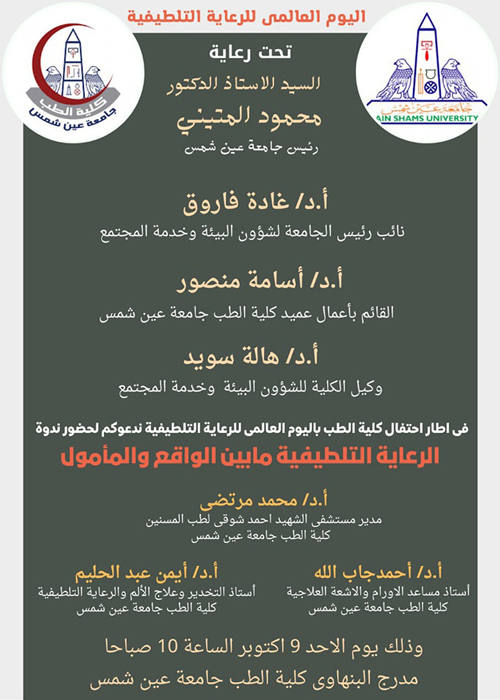Palliative care between Reality and aspiration...A symposium at the Faculty of Medicine, Ain Shams University
Within the framework of the celebration of the Faculty of Medicine, Ain Shams University on the International Day of Palliative Care, the Faculty of Medicine held a symposium entitled Palliative Care between Reality and aspiration, sponsored by Prof. Dr. Mahmoud El-Metini, President of Ain Shams University, Prof. Dr. Ghada Farouk, Acting Vice President of Community Service and Environmental Development, Prof. Dr. Osama Mansour, Acting Dean of the Faculty of Medicine, and Prof. Dr. Hala Swaid, Vice Dean of the Faculty of Medicine for Community Service and Environmental Development Affairs.
In her speech, Prof. Dr. Hala Sweid pointed out the importance of these seminars that the Faculty of Medicine carries out in spreading community awareness and educating young doctors about the basics of palliative care as a new field aimed at improving the quality of life for patients in advanced stages of diseases, especially oncology patients.
Dr. Mohamed Mortada, Director General of the Elderly Hospital, also pointed to the great achievement of opening the palliative care unit in the Elderly Hospital as a distinct unit that provides a distinguished service for palliative care patients with a capacity of 10 beds, which was increased to 12 beds a month after the opening of the unit, which confirms the great need for this service from Elderly patients, pointing to the importance of home palliative care as an important and complementary part of palliative care in the hospital.
Dr. Ayman Abdel Rahim, Professor of Anesthesia and Consultant Palliative Care, stressed the importance of having a palliative care unit in the Elderly Hospital, as it represents a qualitative transfer in the field of palliative care, and that it will be the basis for training and continuing medical education in this field.
In his speech, Dr. Ahmed Gaballah, Assistant Professor of Oncology, Faculty of Medicine, Ain Shams University stressed the importance of palliative care being multidisciplinary, with an active contribution from different disciplines to serve patients optimally, with attention to patients’ families and educating them about the nature of the disease and how to deal with it as an important part of Integrated medical service required for palliative care patients.



.svg)




